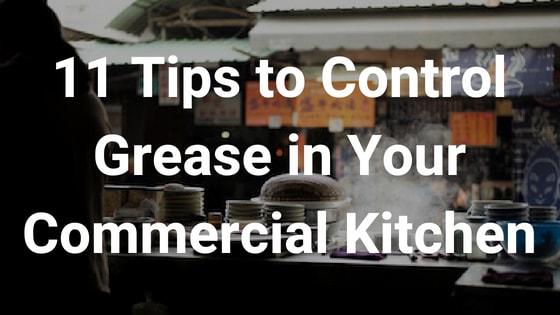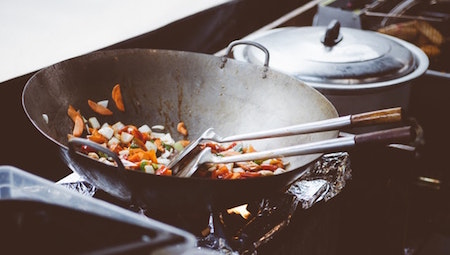
Grease traps are necessary for a commercial kitchen. Commercial kitchens can be found in mobile food facilities, nursing homes, hotels, churches, hospitals, restaurants, and so on.
Grease traps help prevent fats, oils, and grease (FOG) from flowing out with wastewater into the sanitary sewer system. While these traps are required in nearly all commercial kitchens, there is much more to controlling FOG.
By controlling fats, oils, and grease in your commercial kitchen, you will be able to minimize the possibility of:
- Enforcement action by local authorities due to violations ordinances.
- Getting several testing requirements imposed due to a history of violations.
- Chargebacks for repairs to sewer pipes attributed to your FOG, or surcharges from your local sewer authority.
- Lawsuits from the public or workers exposed to raw sewage during backup.
- Lawsuits from nearby businesses over sewer problems caused by your negligence.
- Losing revenue to emergency shutdowns caused by sewage backups and expensive bills for plumbing and property repairs.
Here are 11 tips to control grease in your commercial kitchen & help with restaurant cleaning.
1. Clean Your Grease Trap on a Regular Basis
Ensuring your grease trap is in tiptop condition will allow it to function efficiently. To get started with the cleaning routine, consult the trap’s manufacturer. This will help you get recommendations on how best to clean the grease trap.
If you find the cleaning routine daunting, you can always hire a competent grease trap cleaning company to do it for you.
2. Minimize the Amount of Grease Going Through Sinks and Dishwashers
This will help you reduce the flow of effluent going to the grease trap. Consequently, you will be able to drastically reduce the cleaning frequency.
But how do you ensure the FOG effluent is reduced? Well, one effective way of doing this is to post “No Grease” signs above the sinks and in front of dishwashers.
3. Reuse Your Waste Cooking Oil
You can turn your waste cooking oil into a revenue source. There are many waste cooking oil companies out there that can pay you for your used cooking oil. They will collect your oil and convert it into biodiesel fuel.
4. Dry Wipe Dishware, Pans and Pots Prior to Cleaning Them
By doing this, you will be able to reduce the FOG entering your kitchen’s grease trap. This means fewer plumbing problems and infrequent grease trap cleaning.

5. Use In-Sink Strainers
An in-sink strainer keeps a drain from unwanted waste and aids to prevent the drain from getting clogged. It helps keep the drain flowing freely. In-sink strainers are also easy to install and empty.
6. Discard Food Waste with Other Solid Waste
This helps reduce the amount of effluent going down the sewer. Whether its food waste caught in a strainer or paper towels soaked in grease, don’t send it down the drain. You can easily dispose of the food waste with other solid waste. You could also dispose of food waste by recycling them.
7. Pour Grease in Designated Places
Pouring grease in areas such as toilets or sinks could land you in legal hot soup. Such areas are not designed to handle FOG.
8. Clean the Exhaust Filters in Your Kitchen Regularly
If FOG accumulates on the exhaust filters of your kitchen, the likelihood that it will end up on your building’s exterior is high. Grease accumulation on kitchen exhaust filters represents a major fire risk. It can also be washed by rain into the storm sewers.

9. Cover the Outdoor Containers Holding FOG
Make sure you cover these containers if you are storing used cooking oil outside. This helps prevent the used cooking oil from entering storm drains when it rains.
Also, store the oil containers or grease traps away from the wastewater system. This way, little or no grease will escape into the storm drain catch basins if there is a leak or an overflow.
10. Regularly Clean Your Kitchen Floors
Your employees may be at risk of slipping if grease accumulates on your floors. Prevent accidents by ensuring the floors are cleaned daily. You can find various grease removing products at your local store. Clean floors will help you avoid potentially costly accidents.
11. Include FOG Kitchen Cleaning Rules in Your Staff Training
Want to make a difference in your kitchen? If so, you need to train your kitchen staff on best management practices for FOG. Better still, make it a standard part of training for all employees working in the kitchen. By training your employees on such best practices, you will be able to reduce problems in your kitchen.
There you go! 11 tips to control grease in your commercial kitchen and keep your restaurant clean. By following these tips you’ll help keep our wastewater clean, reduce emergency plumbing issues and reduce the risk of fines.